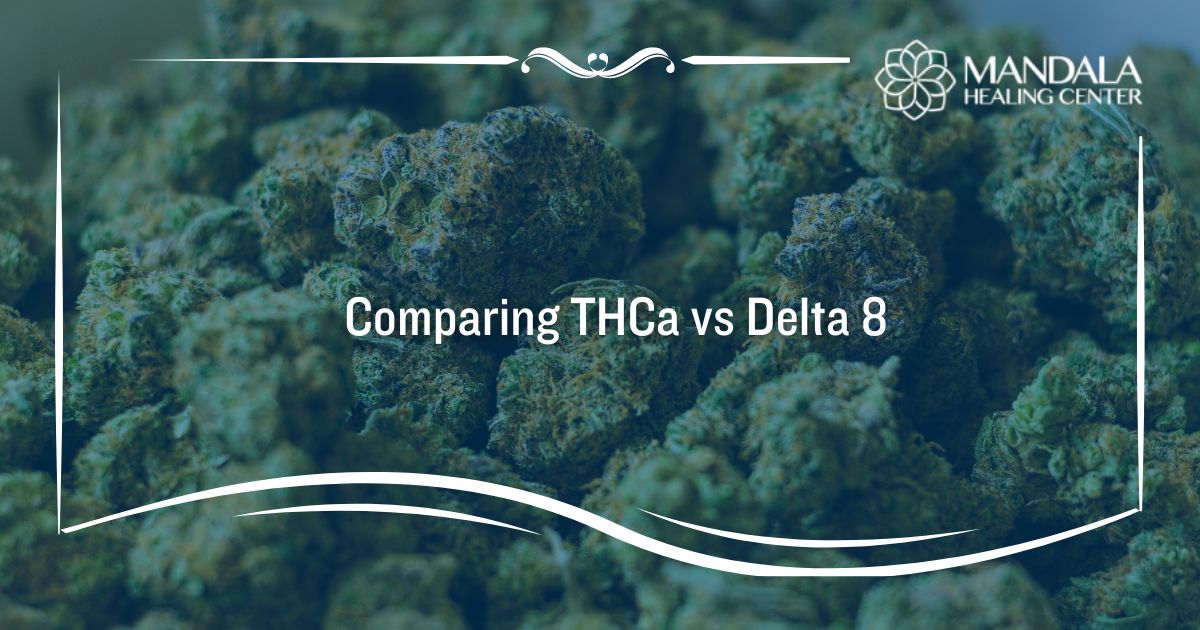Marijuana is one of the most commonly abused substances, aside from alcohol. According to the National Institute on Drug Abuse (NIDA), 52.5 million people abused cannabis in the United States in 2021.
While cannabis is legal for medicinal and recreational use in many states, it remains federally illegal. As a result, people have begun looking for ways around marijuana bans.
Many states cannot legally sell marijuana in its traditional form. This has led people to create new marijuana products that are not currently banned under federal or state law. Two of these products include THCa and delta-8 THC.
Both of these substances are chemical compounds found in hemp and cannabis plants. While they have some similarities, they have plenty of differences to be aware of.
THCa (tetrahydrocannabinolic acid) does not have psychoactive properties until it is heated, which converts it into traditional delta-9 THC. This makes THCa the precursor to THC. On the other hand, delta-8 comes from hemp, causing it to have a very small percentage of THC in it.
What is THCa?
THCa is the precursor to THC. Heating THCa will convert it into the form of THC that causes intoxicating effects. Without heating the substance, it does not provide any psychoactive side effects.
Some people use THCa products therapeutically. While there is limited evidence of its benefits, people claim it can produce pain relief, nausea relief, aids sleep in people with insomnia, and more. This is why some people consume raw THCa without heating it.
Other individuals in states where marijuana use is prohibited might purchase THCa instead. After heating it, it turns into a THC product. In other words, people can get high when they smoke THCa.
THCa does not contain a large percentage of THC until heated, so it meets the 2018 Farm Bill guidelines that allow the sale of hemp or cannabis products with 0.3% of THC or less. In other words, THCa is federally legal to sell, purchase, and consume.
What is Delta 8?
Delta 8 is a cannabinoid that is found in hemp and marijuana plants. While some places have begun banning it, you can still buy it legally under federal law. It is marketed as having less than 0.3% THC, which means it produces very slight psychoactive effects.
Some people refer to delta 8 as “diet weed.” When consumed, it can produce a fuzzy or euphoric high that is less intense than traditional marijuana. Most of the time, you can buy delta 8 in the form of gummies, vapes, and capsules.
Individuals might use delta 8 therapeutically, to manage stress, insomnia, or a decreased appetite, but there has been evidence that delta 8 is dangerous to consume. According to the Food and Drug Administration (FDA), there have been “104 reports of adverse events in patients who consumed delta-8 THC products between December 1, 2020, and February 28, 2022.”
The Differences Between THCa and Delta 8
Delta 8 and THCa are both hemp-derived products that were created as a loophole to overcome marijuana bans. However, these substances have many differences to be aware of.
The main differences between THCa and delta 8 include:
Extraction Process
THCa is extracted without heat to ensure it is not converted into delta-9 THC. This means manufacturers use cold extraction processes like ethanol, mechanical, and CO2 extraction. After THCa is extracted, it is turned into topicals, tinctures, or edibles.
On the other hand, delta 8 is created a bit differently. Manufacturers extract CBD from the marijuana plant and then convert it into Delta 8. This is called “isomerization,” which involves using an acidic catalyst to create the Delta 8.
Chemical Structure
THCa has a carboxylic acid group attached to its monomer, while delta 8 does not. As a result, THCa is less bioavailable than delta 8. This means THCa cannot bind to cannabinoid receptors in the brain to create a high or intoxicating effect.
Effects
Some research supports the idea that THCa has anti-inflammatory and antiemetic effects. Due to this, it might be beneficial to consume if you have a chronic pain condition like arthritis or trouble with nausea.
Once THCa is heated, it is turned into a psychoactive cannabinoid. It can produce potent effects similar to that of marijuana.
Delta 8 can cause similar effects as smoking cannabis. However, these effects are muted and less intense. People might experience euphoria and relaxation, while others deal with adverse effects like anxiety and hallucinations.
Can You Mix THCa and Delta 8?
Some people might mix THCa and delta 8 in hopes that they will experience anti-inflammatory effects. If you consume THCa without heating it, there is a possibility that you will experience relief from pain and nausea.
Delta 8 has been known to produce adverse reactions. Combining THCa with delta 8 could lead to dangerous effects, including hallucinations, vomiting, confusion, and more.
If the THCa is heated when mixing it with delta 8, you will experience significant impairment and cognitive effects. You could have a pleasant experience, however, you are at risk of dealing with dangerous symptoms. In other words, you should never combine THCa and delta 8.
Find Help for Cannabis Abuse and Addiction
If you or a loved one suffers from an addiction to any type of cannabis product, Mandala Healing Center is here to help. We can provide the tools and support you need to achieve long-lasting sobriety from cannabis and other substances.
Clients are taken on a journey of healing through complete immersion into evidence-based clinical modalities, multifaceted alternative therapies, and expert medical management, allowing them to fully detox and recover from drug and alcohol addictions. Through a program of care designed to encourage change, a foundation is created that allows clients to find their higher purpose and reclaim their lives.
Contact us today to learn more about our marijuana addiction treatment center.












